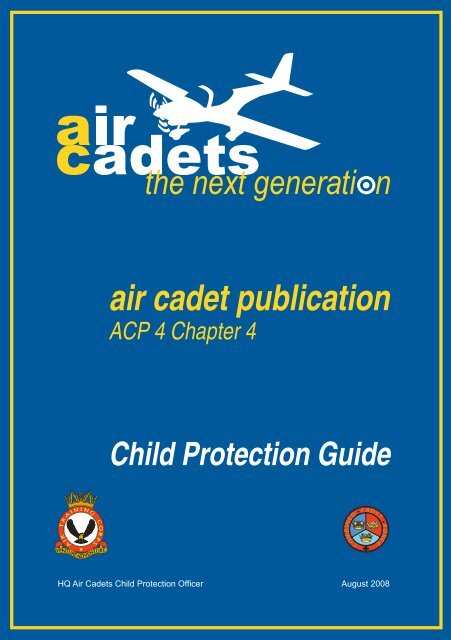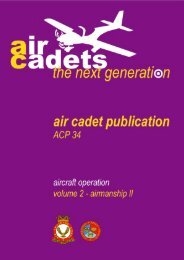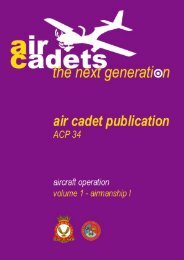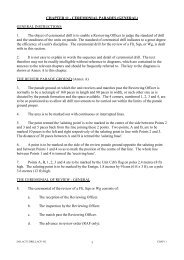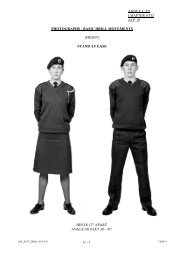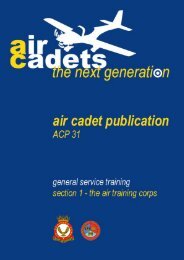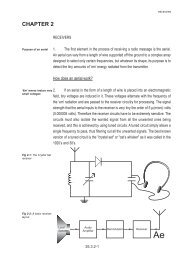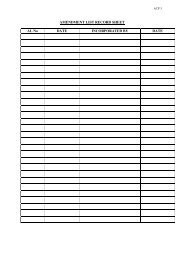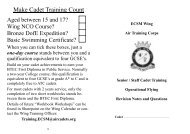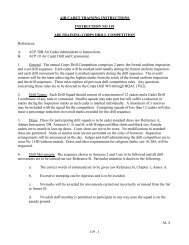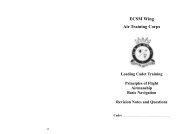ACP 4 - Child Protection Guide - 967 Air Cadets
ACP 4 - Child Protection Guide - 967 Air Cadets
ACP 4 - Child Protection Guide - 967 Air Cadets
Create successful ePaper yourself
Turn your PDF publications into a flip-book with our unique Google optimized e-Paper software.
air cadet publication<br />
<strong>ACP</strong> 4 Chapter 4<br />
<strong>Child</strong> <strong>Protection</strong> <strong>Guide</strong><br />
COMBINED<br />
CADET<br />
FORCE<br />
HQ <strong>Air</strong> <strong>Cadets</strong> <strong>Child</strong> <strong>Protection</strong> Officer<br />
August 2008
CHILD PROTECTION GUIDE<br />
Introduction<br />
1. For the purposes of this document, a “child” is a person under the age of 18 in<br />
accordance with Article 1 of the UN Convention on the Rights of a <strong>Child</strong>. The main<br />
burden of child protection within the <strong>Air</strong> Cadet Organisation (ACO) falls on those in direct<br />
contact with cadets under the age of 18. The welfare of the child is paramount 1 . The aim<br />
of this booklet is therefore to provide guidance to all adult members of staff 2 so that they<br />
may have a clear vision of the action to take should they become directly involved with<br />
child protection issues during the course of their duties.<br />
<strong>Child</strong> protection policy<br />
2. It is the primary responsibility of all adult members of the ACO to safeguard the<br />
moral, psychological and physical welfare of children regardless of gender, religion,<br />
race, ability, disability, sexuality and social background by protecting them from any form<br />
of physical, emotional and sexual abuse or neglect.<br />
3. All children have the right to protection from all forms of abuse and harm when<br />
engaged in ACO activities and when in contact with members of the ACO. All adult<br />
members of staff have a duty of care, which makes them responsible both for<br />
safeguarding children in their care from abuse and harm and for responding swiftly and<br />
appropriately when suspicions or allegations of inappropriate behaviour arise; this<br />
applies to all cadets and not just cadets under their immediate control.<br />
Adult duty to speak out<br />
(often described as “whistle blowing”)<br />
4. Any form of child protection concern can be an exception to the normal ACO<br />
requirement on other issues to follow the routine chain of command. Every adult member<br />
of the ACO is required to report any suspicions or evidence of abuse or harm concerning<br />
a child whether it is inside or outside the Corps and no-one should feel, or be made to<br />
feel uncomfortable, bullied or intimidated by doing so or being coerced into not reporting<br />
them.<br />
Cadet freedom to speak out<br />
5. <strong>Cadets</strong> should feel comfortable and free to report, at any time, any child protection<br />
concerns within or outside the ACO to any member of staff and all commanding officers<br />
are to endeavour to create a culture to ensure there is some means for cadets to do so.<br />
<strong>Cadets</strong> should know to whom they should report concerns and also what is likely to<br />
happen as a result – they must have confidence that they are being listened to. In<br />
addition to support within the Sqn, contact details for the NSPCC <strong>Child</strong>Line (0800-1111)<br />
(http://www.childline.org.uk/Pages/default.aspx) are to be prominently displayed.<br />
1<br />
<strong>Child</strong>ren Act 1989<br />
2<br />
For the purposes of this guide, the phrases “adult member(s) of staff” and “adult member(s) of the<br />
ACO” also includes cadets who are over the age of 18
Working safely with children and young people<br />
6. It is the responsibility of each adult member of the ACO to ensure that:<br />
• their behaviour is appropriate at all times<br />
• they observe the rules established for the safety and security of cadets<br />
• they follow the procedures following suspicion, disclosure or allegation of<br />
child abuse<br />
• they recognise the position of trust in which they have been placed, and<br />
• in every respect, the relationships they form with cadets in their care are<br />
appropriate<br />
7. All adult members of the ACO must accept and understand this policy and they must<br />
also agree to put the organisation’s policy on child protection into practice and adhere<br />
to the Codes of Behaviour detailed at the end of this chapter.<br />
What if you suspect abuse or an allegation is<br />
made?<br />
8. <strong>Child</strong> abuse occurs when a child has suffered from, or is at significant risk of suffering<br />
from, ill treatment or impairment of development, by any person who knowingly colludes<br />
with or fails to prevent the ill-treatment of the child by not ensuring reasonable standards<br />
of care and protection. You should be aware that abusers are not just strangers; they<br />
can include parents, carers, family members, friends, people in positions of trust and<br />
authority, other children or young people, anyone who has contact with children and<br />
young people. <strong>Child</strong>ren who are abused are often abused by an adult they know and<br />
trust. <strong>Child</strong>ren will and should see you as a person they can have faith in and from<br />
whom they can seek help - listen to them, take what you are told seriously and you will<br />
be helping to reassure and protect the child.<br />
9. You must do something if:<br />
• a child tells you, or shows signs that, he or she is being abused in any way<br />
• you have reason to believe anyone within or outside the ACO is abusing or<br />
harming a child<br />
• someone tells you that a child is being abused<br />
• you become aware that someone who has contact with and access to children<br />
has offended against them or poses a risk to them
10. When a cadet speaks to you about a child protection matter:<br />
Make sure that you are out of hearing and sight of others and that you have a third<br />
person (who is acceptable both to you and the cadet) present to witness what is said:<br />
• listen carefully to what they are saying<br />
• show you take them seriously<br />
• avoid asking them to repeat the information<br />
• explain that you cannot keep what they tell you a secret, but any information<br />
will remain “in confidence”<br />
• reassure them that they have done the right thing<br />
• make no judgement about what you have heard and stay calm<br />
• make an immediate, careful, record of what has been said. Use their actual<br />
words wherever possible.<br />
The procedure to follow<br />
11. If you suspect abuse, a cadet confides in you, or a complaint is made about any<br />
adult or about yourself, it is your duty to report the concern. However, it is not your<br />
responsibility to decide whether or not child abuse has taken place. No investigation or<br />
questioning is to be undertaken. The proper (statutory) authorities for dealing with<br />
cases of child abuse are the local authority social services department (children’s<br />
social care), the police or the NSPCC. Arrangements differ across the UK and appropriate<br />
local contacts should be readily available and advertised within your squadron and<br />
wing. Swift reporting will enable the correct authorities to give advice and take appropriate<br />
action.<br />
12. The responsibility for reporting concerns to the appropriate statutory authority<br />
normally lies with the individual who receives a complaint or who suspects abuse.<br />
However, where time and circumstances allow (which normally should be the case),<br />
the matter is to be discussed with the Sqn CO and Wing Administrative Officer (Wg Ad O)<br />
(if applicable) who will consult with the <strong>Child</strong> <strong>Protection</strong> Officer or Personnel Staff Officer<br />
(PSO) at HQ <strong>Air</strong> <strong>Cadets</strong>. The role of the chain of command is not to judge but to pass on<br />
information for advice and to support the cadet.<br />
13. In urgent cases, if you have an immediate concern about the welfare of a child who<br />
may be at risk, you must make direct contact with the police, social services or the<br />
NSPCC, reporting later to your chain of command. Ensure you write down times, facts,<br />
observations (verbatim speech if possible). Have the cadet’s name and address and<br />
the name and address of their parent/guardian/carer available.<br />
14. The parents or guardians/carers of the cadet subject of the disclosure or allegation<br />
should normally be informed by the Sqn CO as soon as possible that a report is being<br />
made to the police or social services, unless they themselves are implicated by the<br />
report.
15. In cases where you hear allegations about yourself or your colleagues, or hold<br />
suspicions or concerns in which your colleagues are implicated, you should consult<br />
your superior officer immediately who will, in turn, advise the Wg Ad O, where applicable.<br />
If your superior officer is implicated in any allegations or suspicions you should<br />
immediately consult your Wg Ad O. In these circumstances, the Wg Ad O is to ensure<br />
that the chain of command is informed and the matter reported to the Personnel Staff<br />
Officer or Deputy Personnel Staff Officer at HQ <strong>Air</strong> <strong>Cadets</strong> without delay. In addition,<br />
when members of staff are implicated the matter will normally be reported to the Local<br />
Authority Designated Officer, who is the point of contact for all agencies when there are<br />
allegations made against individuals working with children, so that cases can be dealt<br />
with across county boundaries.<br />
16. For reasons of confidentiality the number of people to be involved in alleged child<br />
abuse cases reported to the authorities are to be kept to a minimum (the ‘need to know’<br />
principle).<br />
Local information<br />
17. Use this space for keeping your own contacts/telephone numbers:<br />
Wg Ad O<br />
HQ <strong>Air</strong> <strong>Cadets</strong> 01400-267088<br />
<strong>Child</strong> <strong>Protection</strong> Officer<br />
cpo@atc.raf.mod.uk<br />
HQ <strong>Air</strong> <strong>Cadets</strong><br />
Personnel Staff Officer 01400-267638 or 267639<br />
Local Authority Social Services<br />
NSPCC <strong>Child</strong> <strong>Protection</strong> Helpline 1 0808 800 5000<br />
Police (local number)<br />
(or 999 in any emergency)<br />
1<br />
The NSPCC Helpline advisers are all trained child protection officers. They can help with a range of<br />
child-care problems and can offer expert advice. A call to the helpline can help stop a difficult situation<br />
getting out of control and it’s open 24 hours a day, 365 days a year.
Contacting Local Authority Social Services or the<br />
Police<br />
• ask for the Duty Officer (or Emergency Duty Team) and say that you wish to<br />
discuss a matter of child protection<br />
• ask for the name of the person with whom you are speaking<br />
• discuss all the information you have (nothing is to be filtered or withheld)<br />
• state your intention to advise your chain of command<br />
• ask if anyone else should be informed<br />
• keep a record of your conversation and of any advice given.
CODE OF BEHAVIOUR<br />
What you must do:<br />
ALWAYS adhere to these guidelines<br />
ALWAYS treat everyone with dignity and respect<br />
ALWAYS set an example you would wish others to follow<br />
ALWAYS treat all cadets equally – show no favouritism<br />
ALWAYS plan training and activities that involve more than one other person being<br />
present, or at least are within sight and hearing of others<br />
ALWAYS respect a cadets right to personal privacy<br />
ALWAYS avoid unacceptable situations within a relationship of trust, eg a sexual<br />
relationship with a cadet over the age of consent<br />
ALWAYS plan separate sleeping arrangements for adult members of staff and cadets<br />
and, where possible, separate washing and toilet facilities for cadets under<br />
the age of 18<br />
ALWAYS allow cadets to talk about any concerns they may have<br />
ALWAYS encourage others to challenge any attitudes or behaviours they do not like<br />
ALWAYS avoid being drawn into inappropriate attention seeking behaviour (eg tantrums,<br />
crushes and infatuations)<br />
ALWAYS follow the ACOs ‘no alcohol policy’ when cadets are in your care<br />
ALWAYS keep other members of staff informed of where you are and what you are doing<br />
ALWAYS remember someone else might misinterpret your actions, no matter how well<br />
intentioned<br />
ALWAYS take any allegations or concerns of abuse seriously and refer immediately<br />
ALWAYS be aware that child protection issues can be complex and distressing. You<br />
are encouraged to seek help from specialist agencies if you have been affected<br />
by these matters<br />
ALWAYS remember this code even at sensitive moments, eg when responding to<br />
bullying, bereavement or abuse
What you must not do:<br />
NEVER trivialise abuse<br />
NEVER form a relationship with a cadet that is an abuse of trust<br />
NEVER condone overt sexual behaviour between cadets<br />
NEVER permit abusive peer activities, eg initiation ceremonies, bullying, etc<br />
NEVER engage in inappropriate behaviour or contact, physical, verbal or sexual<br />
NEVER play physical contact games with cadets<br />
NEVER touch cadets unless it is a necessary part of training, or for safety reasons<br />
NEVER make suggestive remarks or threats to cadets, even in fun<br />
NEVER use inappropriate language or display improper behaviour towards cadets<br />
(verbally, in writing, ‘phoning, text messages, e-mail or via social network sites<br />
on the internet)<br />
NEVER ignore an allegation because you personally find it unbelievable. Just because<br />
the person about whom the allegation is made is known to you, and may be a<br />
trusted colleague or friend, does not mean that the allegation is necessarily<br />
unfounded<br />
NEVER attempt to contact a cadet or their parent/guardian/carer who you believe may<br />
have made an allegation against you<br />
NEVER, under any circumstances, talk to the media, at the time or later<br />
NEVER let allegations, suspicions or concerns about abuse go unreported<br />
NEVER rely on your good name to protect you<br />
Remember!<br />
• never do nothing<br />
• don’t assume someone else will do something<br />
• never push a child for more information<br />
• never discuss your worries with the suspected abuser.
Don’t keep it<br />
to yourself<br />
Please call us any time on 0808 800 5000<br />
or textphone for people who are deaf or<br />
hard of hearing on 0800 056 0566<br />
or email help@nspcc.org.uk<br />
The NSPCC <strong>Child</strong><br />
<strong>Protection</strong><br />
Helpline is a free<br />
24-hour service<br />
that provides<br />
counselling, information<br />
and advice<br />
to anyone concerned<br />
about a<br />
child at risk of<br />
abuse.<br />
alternatively call<br />
NSPCC Asian <strong>Child</strong> <strong>Protection</strong> Helpline<br />
(Mon-Fri 10am-6pm) 0800 096 7719<br />
NSPCC Cymru/Wales <strong>Child</strong> <strong>Protection</strong><br />
Helpline<br />
(Mon-Fri 10am-6pm) 0808 100 2524<br />
RAFC GRAPHICS REF: 33.225


